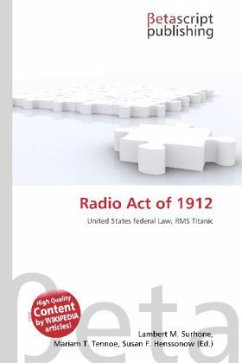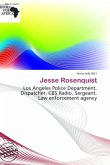Please note that the content of this book primarily consists of articles available from Wikipedia or other free sources online. The Radio Act of 1912 is a United States federal law that required all seafaring vessels to maintain 24-hour radio watch and keep in contact with nearby ships and coastal radio stations. Part of the impetus for the act''s passage was the sinking of the RMS Titanic. Other factors included an ongoing conflict between amateur radio operators and the U.S. Navy and private corporations, that included the amateurs forging naval messages and issuing fake distress calls. The Wireless Ship Act of 1910 was seen as too weak to address the problems. The United States Congress considered six different proposals for replacing it in the period between 1910 and 1912, eventually enacting the 1912 Act.
Bitte wählen Sie Ihr Anliegen aus.
Rechnungen
Retourenschein anfordern
Bestellstatus
Storno








